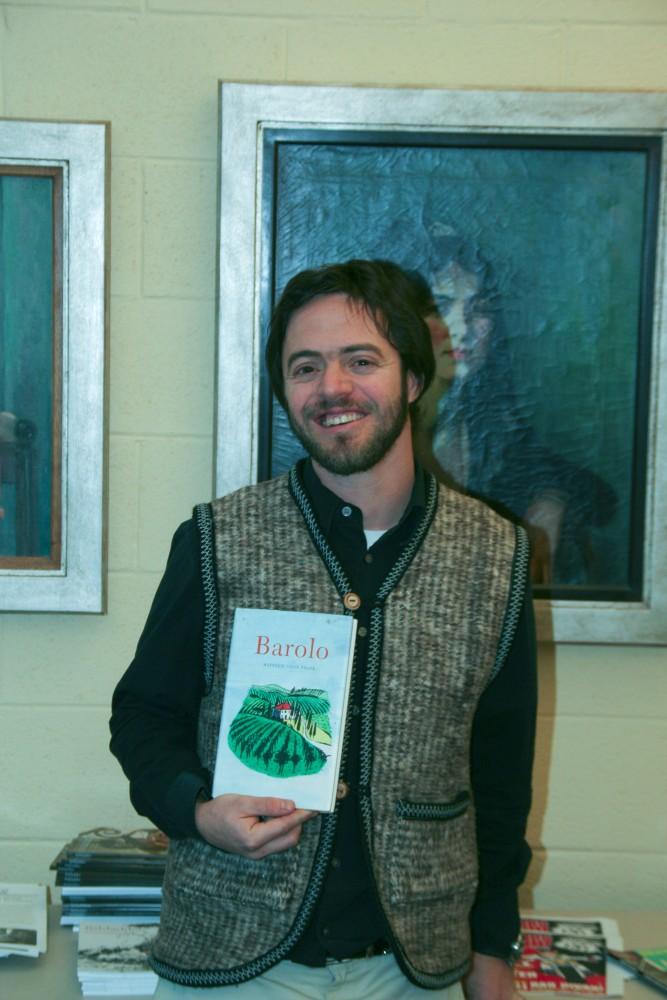EAT, SLEEP & PUBLISH

Matthew Frank poses with his new book, “Barolo”
Jan 27, 2011
Two years after earning a bachelor’s degree from the University of Illinois, Grand Valley State Writing Professor Matt Frank found a job in Northern Italy’s scenic wine country.
The work was hard – the 12-hour days left his hands callused and bruised. The pay wasn’t much – his wages were food and wine. His housing was nothing to brag about – he lived in a tent.
Then there were the helicopters – the Italian Military Police-operated choppers that raid vineyards across the Northern Italian countryside looking for undocumented workers such as Frank.
In his 2010 food memoir, “Barolo,” Frank chronicles the seven months he spent illegally harvesting grapes on the property of famed Italian vintner Luciano Sandrone.
He said his passion for a good meal and a good trip carried him across the Atlantic Ocean to work on a steep hill in Barolo, Italy – almost 5,000 miles from his hometown of Chicago.
Barolo, a town with a population of 646 and a reputation for exporting $400 bottles of wine and white truffles that cost more than a round-trip flight to Italy, is a food writer’s paradise.
However, Frank was not raised eating cr?®me brulee from a silver spoon. He learned the difference between bold and bland the hard way.
Growing up, his parents both held full-time jobs and paid very little attention to the kitchen. When they did cook, they turned to the microwave.
“My dad would scramble some eggs and microwave these awful, awful omelets, and they would just blow up into this sort of puffy, rubber, wagon-wheel of egg,” Frank said.
His parents’ affinity for irradiated omelets and TV dinners led him to approach food in a way that conflicted with his family’s idea of a balanced diet.
“It manifested itself as some sort of teenage rebellion – learning to cook and eat well and shun my parents’ ways,” he said. “I didn’t get into spray-painting my name on the undersides of overpasses or playing mailbox baseball or breaking car windows.”
For fifteen years, Frank immersed himself in the food industry, first as an 11-year-old washing dishes in a Chicago chicken joint, then flipping eggs in a diner/bowling alley in Juneau, Alaska, and eventually apprenticing under gourmet chef Charlie Trotter at his Chicago restaurant.
During his restaurant work, Frank honed his writing ability and eventually developed the skills needed to get published in “The Huffington Post,” “The New Republic” and “The Best Food Writing Anthology.”
“The imaginative alchemy of creating a certain dish is similar to the imaginative alchemy involved in writing a poem or a piece of creative nonfiction,” he said. “Often times it involves taking two seemingly dissimilar things – in the writing world its themes or concrete images, in the food world its two dissimilar ingredients – and working to find a bridge to make them work.”
University of Illinois Creative Writing Professor Mike Madonick, who taught Frank during his undergrad years, says that the Chicago native cannot pass up a reasonable urge to pursue a learning experience.
“Matt told me that he had to miss some classes because he had the opportunity to drive down to New Orleans and meet Emeril Lagasse,” Madonick said. “I couldn’t believe that he couldn’t lie, but the worst thing I could do was to stop him.”
For his upcoming book, scheduled for a 2012 release, Frank traveled to Northern California to learn more about treatment options for his mother, who was diagnosed with cancer in 2006. In “Pot Farm,” Frank again describes his experience clipping plants, this time as a trimmer on a medical marijuana farm.
“It’s beneficial to anyone to immerse oneself in one place for an extended period of time,” Frank said.
For college students looking to find their inner food connoisseur, Frank recommends bi-weekly trips to the Grand Rapids farmers market on Fulton and Fuller, which peddles fresh, local ingredients for cheaper prices than the “depressing Family Fare fluorescent-and-preservative stink.”
“And a good quality home-cooked burger, on good bread, is cheaper than any McAbomination,” he added.





















